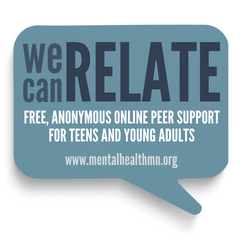RELATE Online Chat Launches: New Peer-To-Peer Support Service for Youth Ages 13-25

Since the start of the pandemic, more and more people are talking about mental health. An increasing number of folks are starting to see it for what it is: one important component of your overall health and well-being, just like your physical health. But mental health conditions, resources, and conversations can still feel complicated and out of reach, especially if you don’t know where to turn for help. If you’re a young person, ages 13-25, you may also feel like no one can relate to what you’re going through.
And with youth mental health reaching crisis levels, we knew we needed to act. This Mental Health Month, we’re excited to launch our new RELATE service on May 2, 2022 – an online chat run by young adult volunteers who know what it’s like to deal with their own mental health issues. They can relate and they share their experiences and provide compassionate, confidential and anonymous peer-to-peer support and hope for those looking for help. Learn more
But no matter your age or demographics, it’s important to look for common, specific warning signs of mental health conditions or crises. This Mental Health Month, we’re reminded how people are learning about mental health topics for the first time. Having a widespread understanding of the topic can help you be more informed if you or someone you know is experiencing a mental health condition or crisis.
Around half of the people in the U.S. will meet the criteria for a diagnosable mental health condition at some point in their life, so everyone should know what to look out for. Everyone should have the support needed to thrive. Communities that have been historically and presently oppressed face a deeper mental health burden because of the added impact of trauma, oppression, and harm.
There’s often no one single cause for a mental health condition. Instead, there are many possible risk factors that can influence how likely a person is to experience a mental health condition or how serious the symptoms may be.
Some risk factors for mental health conditions include: trauma, which can be a one-time event or ongoing; your environment and how it impacts your health and quality of life (also known as social determinants of health like financial stability and health care access); genetics; brain chemistry; and your habits and lifestyle such as a lack of sleep.
Of course, understanding the risk factors for a mental health condition can be more difficult when it’s your own mental health. Take time to ask yourself about your thoughts, feelings, and behaviors to see if this is part of a pattern that may be caused by a mental health condition.
Here are some questions to get you started:
- Have things that used to feel easy started feeling difficult?
- Does the idea of doing daily tasks like making your bed now feel really, really hard?
- Have you lost interest in activities and hobbies you used to enjoy?
- Do you feel irritated, possibly to the point of lashing out at people you care about?
Our society focuses much more on physical health than mental health, but both are equally important. If you are concerned about your mental health, there are several options available.
You are not alone – help is out there, and recovery is possible. It may be hard to talk about your concerns, but simply acknowledging to yourself that you’re
struggling is a really big step.
Taking a screen at mentalhealthmn.org/work/screening can help you to better understand what you are experiencing and get helpful resources.
At Mental Health Minnesota, we have free, accessible resources available to help youth, families and adults get support for any mental health concern or diagnosis before #B4Stage4 or before a crisis:
- RELATE: New, peer-to-peer online chat support service run by young adults for youth ages 13-25 launching May 2, 2022
- Minnesota Warmline – Certified Peer Support Specialists offer free support to anyone struggling with mental health concerns
- Mental Health Helpline – Mental health resource, information and local provider referrals
Fact Sheets: Back To Basics – Practical Mental Health Information
- MHM 2022 Back to Basics: FACT SHEET Starting to Think About Mental Health (PDF)
- MHM 2022 Back to Basics: FACT SHEET What Plays a Role in Developing Mental Health Conditions (PDF)
- MHM 2022 Back to Basics: FACT SHEET Maintaining Good Mental Health (PDF)
- MHM 2022 Back to Basics: FACT SHEET Recognizing When You Need Help with Your Mental Health (PDF)
- MHM 2022 Back to Basics: FACT SHEET What to Do When You Need Help (PDF)
- MHM 2022 Back to Basics: FACT SHEET Where to Go (PDF)
- MHM 2022 Back to Basics: FACT SHEET Terms to Know (PDF)